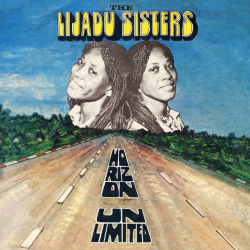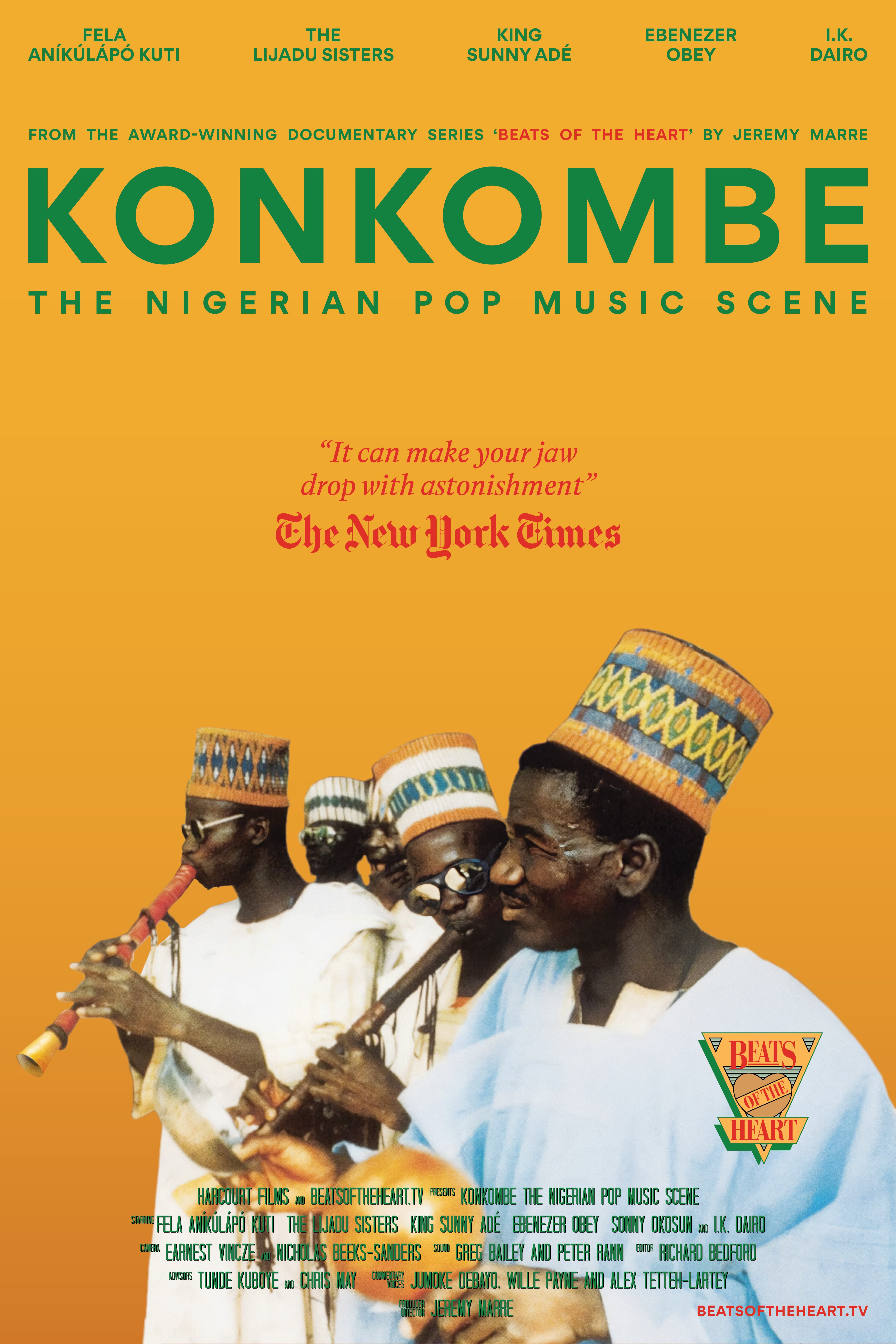The Lijadu Sisters, Numero Group & BeatsofTheHeart.tv Announce Documentary Screenings In NYC, LA, Chicago, London & Lagos This Fall

|
|
|
|
|
This fall, the indelible work of The Lijadu Sisters will be further celebrated at a series of special film screenings and talks at London's RIO, Brooklyn's BAM, Chicago's The Block Museum of Art, Los Angeles' Vidiots and Lagos' Jazzhole. Presented with the approval of Harcourt Films and the estate of groundbreaking filmmaker Jeremy Marre, in partnership with Native, NTS, Numero Group and more, each event will feature screenings of Konkombe: The Nigerian Pop Music Scene (1979), from the Cannes award-winning, 14-part musical docuseries Beats of The Heart that came to inspire the likes of David Byrne and Paul Simon.
Screening in higher resolution than ever seen before, Konkombe: The Nigerian Pop Music Scene illustrates how native styles like juju, Afrobeat and highlife all evolved in step with the country's social, political and spiritual currents, before the rest of the world caught wind. In a 1986 preview, The New York Times' Jon Pareles wrote, "Somehow, the director Jeremy Marre manages to document musical events that most outsiders wouldn't even hear about, much less be allowed to attend." Fueled in large part by the month-long, globally-influential Festac '77 festival, Konkombe captures the outspoken yet overlooked Lijadu Sisters at the center of the movement, alongside contemporaries like Benjamin "Kokoro" Aderounmu, King Sunny Adé, I.K. Dairo, and the Sisters' second cousin Fela Aníkúlápó Kuti, before they moved to the US as political refugees. Timed around their birthday on October 22nd, the upcoming events will include a conversation with surviving sister Yeye Taiwo Lijadu, who recently dove deep into the duo's legendary career, legacy and resurgence with The New York Times.
Tickets for the upcoming screenings are available now at BeatsofTheHeart.tv
See the list of dates below, and watch a new trailer for
Konkombe: The Nigerian Pop Music Scene: HERE
Oct 16 – London, UK – Rio Cinema (8.30pm) | Presented by Native & NTS
Oct 19 – London, UK – Rio Cinema (2:30pm) | Presented by Native & NTS
Oct 20 – London, UK – Rio Cinema (6pm) | Presented by Native & NTS
Oct 29 – Brooklyn, NY – BAM Rose Cinemas (7pm + 9:30pm) | Presented by Native
Nov 7 - Chicago, IL - The Block Museum (7:00pm)
Nov 13 – Los Angeles, CA – Vidiots (7:30pm)
Dec 8 – Lagos, Nigeria – Jazzhole (4:00pm) | Presented by Native
Dec 8 – Lagos, Nigeria – Jazzhole (7:00pm) | Presented by Native
"Working on Konkombe with Jeremy Marre and his wife and producer Diana was beautiful. When they came, my daughter was about 8 months old, and they watched us rehearse in this house you see in the film. We would care for my daughter upstairs, and rehearse with the musicians downstairs. I would be coming downstairs holding the baby, and still singing the song with the band. Later on, a beautiful thing happened: in the film crew, there was another producer and wife who told us they had determined not to have children. However, when they saw us rehearsing and being with my daughter, I think I think they both changed their minds. They told me they ended up naming the baby Sarah Taiwo."
-Yeye Taiwo Lijadu
While The Lijadu Sisters have recently been called "fearless and groundbreaking leaders in the male-dominated Nigerian pop music scene" (Billboard) – praised and cited as inspiration by artists like Amaarae, Hayley Williams and so many others – it's taken nearly six decades to finally start receiving the respect, protection and recognition they always deserved. Beginning this fall, an expansive new partnership with Numero Group brings justice to the musical and political impact of Yeye Taiwo Lijadu and the late Kehinde Lijadu, two iconic, identical twin sisters who "helped lay the foundation for African music's global resonance today," and "disrupted men's dominion over it" (Rolling Stone).
Equal parts reissue and reparation, Numero Group's multi-year, multi-record campaign will reintroduce The Lijadu Sisters' entire discography to a new generation. In addition to all five of the imperative albums the sisters released in the 1970s, before regaining control of their catalog in 2021, Numero Group will reveal previously unheard material, unearthed rarities and recent rediscoveries, while amending a history of illicit exploitations, copyright infringements and more of the prejudices The Lijadu Sisters have endured since their formative days, as one of the only women-led acts making music at the outset of Nigeria's national independence and cultural golden age.
Out this Friday, September 20th, a remastered edition of 1979's Horizon Unlimitedmarks Numero Group's inaugural LP/CD release with The Lijadu Sisters, restored in the higher fidelity than ever before, and presenting hits like "Come On Home" like they have never been heard. The package also includes the first-ever transcription of the record's lyrics in both Yoruba and English, corrected album credits and original artwork.
From their trailblazing fusion of funk, reggae, rock, disco and soul, to the battle for civil justice in Africa, the fight for housing rights in their adopted home of Harlem, and their current-day work as spiritual healers, there is so much for so many to discover about The Lijadu Sisters. "Yesterday's struggles have yielded to today's admiration, as the pair have finally been accorded the acclaim their trailblazing influence deserves," writes Mike Rubin in a sweeping new interview with Yeye Taiwo Lijadu for The New York Times. "The Lijadu Sisters' music was striking for its sisterly connection. Singing primarily in English or Yoruba, the pair showcased uncannily synchronized harmonies, conjuring a choir of two."Read the full profile HERE.
Praise For The Lijadu Sisters
"In Nigeria's male-dominated music scene, the Lijadu Sisters were among the first — and fiercest — popular female artists, groundbreaking not only for their music (a mélange that included folky apala, funky Afrobeat and slinky disco) but also their feminism."
The New York Times
"The Lijadu Sisters helped lay the foundation for African music's global resonance today. As pioneers of Nigerian pop, the continent's most impactful music industry, they diversified the sound and disrupted men's dominion over it."
Rolling Stone
"Fearless and groundbreaking leaders in the male-dominated Nigerian pop music scene...paved the way for modern female African artists like Amaarae and Tems"
Billboard
"The sense of freedom in their vocal performances always gets me"
Hayley Williams
"Trailblazing...The Lijadu Sisters' career-spanning reissue series is significant not only for the wider reception of their work, but also due to the long-term challenges the siblings faced as one of the only women-led acts in Nigeria's male-dominated Afrobeat scene"
Pitchfork
"They were rock & roll as f*ck...I think the Lijadu Sisters were the first alté girls. I think that they helped me build an ethos of how I wanted to operate as an African woman and as an African artist, an African rock star."
Amaarae
"Weaving uplifting, circular grooves with explicit civil justice hymns in both English and Yorubá, they pile up Motown-like piano ostinati over bubbly drum timbres and the eventual body-commanding, dance-inducing, almost-hypnotic bass cadence"
Aquarium Drunkard
|
|


